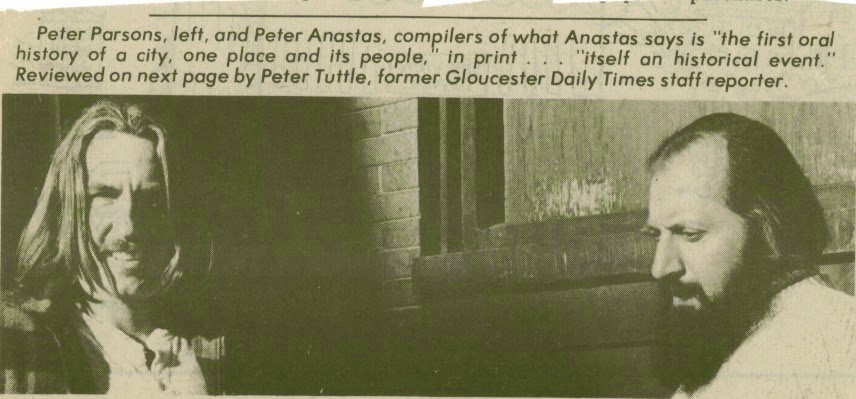A friend put the bug in my ear.
“Why
don’t you write about how people in Gloucester love to talk?” he suggested the other day while we were
discussing local habits and customs.
“To
tell the truth,” I replied, “I’ve been thinking about it.”
“You
mean you’ve been yakking about it up and down Main Street, right?"
“Well,
I’ve been asking people if they’ve ever noticed how much we all enjoy jawing
with each other."
“My
God,” my friend broke in, “the ear is bent as much as the elbow in this town!"
“It’s
a long winter,”
“Don’t
make any excuses,” he answered. “This is
a big oral town, summer or winter. It’s
been that way from the beginning. Do you
know that the largest number of court cases in the 17th and 18th
centuries involved slander? Not only did
people talk about each other at the drop of a hat, they took each other to
court if they didn’t like what they heard somebody else had said about them!”
“Gossip
is another thing,” I said. “It’s endemic
in a small town. You can’t get away from
it. What I’m more interested in is how
the fact that people do love to gab in Gloucester shatters the myth of the
taciturn Yankee, you know—the New Englander of few words.”
“That
only happens with outsiders,” my friend said.
“And maybe it’s done to keep up an image. With each other it’s different. If you call someone up, be prepared for a siege
of it. I always keep a snack and
something to wet my whistle by the phone just in case.”
“You’re
exaggerating,” I said.
“I
kid you not. A call from my mother is
worth an evening.”
“Don’t
blame it on your mother! I’ve never
found you at a loss for words.”
“You’re
right,” he said. “Once someone told me ‘I can tell right off you’re from
Gloucester—you love to talk.”
“Here’s
one for you,” I said. “Some friends from
Philadelphia were visiting last month.
We’re driving down Main Street.
In front of us is a car. Suddenly
a guy waves to the driver from the sidewalk just outside the Savings Bank. The driver jams his brakes on, cranks his
window down, and they start a conversation in the middle of the street on
Saturday morning!”
“I’ve
had that happen to me many a time,” my friend said. “In fact, I’ve done it
myself.”
“Well,
my company was dumbfounded. They asked
me why I didn’t blow my horn and yell at the driver to get going. ‘They’ll move when they’re finished,’ I told
them. ‘Besides, they probably haven’t seen each other for a day or two.’”
“I’ll
never forget how frustrated my wife used to get,” said my friend. “Before we moved back to Gloucester she
always complained she couldn’t get a word in edgewise with me. After we settled here, she just threw up her
hands in despair—‘There’s no relief!’”
“What
do you suppose is the reason for all this loquacity?” I asked.
“I
think it goes back to Gloucester’s having been cut off from the rest of the
world by our location and by the harsh winter weather,” my friend replied. “People
tended to make their own entertainment.
The men would go fishing and leave the women and children to their own
devices. So the women told stories and
gossiped to pass the time. When the men
came home they were expected to share the stories of the trip. What they didn’t tell at home they’d talk out
among themselves on Main Street. The
children picked up the habit of talk as a pastime and oral history. It was the way you found out nearly
everything you knew about the world growing up—and the way you passed it on to
others. Habits and customs like that
persist, even though the need for them changes.”
“And
you think that hasn’t been cut into or destroyed by radio, TV or the movies?” I
asked him.
“People
don’t seem to talk any less do they?”
“There’s
less storytelling and that’s a shame,” I said.
“I
think the older folks feel the youngsters might be bored so they just tell
stories among themselves,” he said. “Of
course, it’s a great loss to the kids.
All that beautiful personal detail dies with the old people—and a whole
way of life dies along with it.”
“We
can joke about talking, “I offered. “But
there’s something really human about it.”
“It’s
real,” he answered. “It’s people
interacting without the interference of media and the outside world. The talk between people is the hum and buzz
of the community. Stop that and you stop
life itself.”
“So
you think Gloucester talk is really a continuation of an age-old need for people
to stay in touch, to remain current with each other—to feel alive in a world
that tends to ignore us?” I asked finally.
“Something
like that,” my friend said.
“Thanks,”
I replied. “That should get me
writing. See you around. . . Oh, if you
come up with anything else, give me a ring.
In fact, call me anyway. . .or I’ll call you.”
“Okay,”
said my friend as he left. “Talk with you later.”
(Gloucester
Daily Times, January 1979, based on conversations with Peter Parsons)



No comments:
Post a Comment